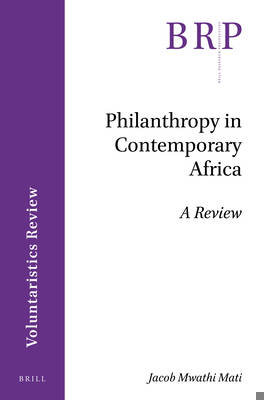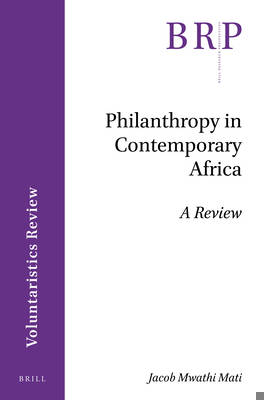
- Afhalen na 1 uur in een winkel met voorraad
- Gratis thuislevering in België vanaf € 30
- Ruim aanbod met 7 miljoen producten
- Afhalen na 1 uur in een winkel met voorraad
- Gratis thuislevering in België vanaf € 30
- Ruim aanbod met 7 miljoen producten
Zoeken
Omschrijving
Despite the availability of a wide range of literature on what is can be construed to be philanthropic behaviour in Africa, there is limited conceptual discussion on what constitutes philanthropy in African context(s). Yet, philanthropic behaviour is culturally rooted phenomena manifesting in diverse forms, expressions, and models. This review contributes to a growing body of literature on conceptions and manifestations of African philanthropy. The review illustrates a complex plurality of actions that fall under cultures and practices of giving in Africa. These include the giving of money, time, knowledge, influence and visibility in support of a cause, valuable goods, and body parts/organs from living and dead. While some of these actions conform to dominant Western notions of philanthropy, others do not. From an analysis of these practices, this paper proposes that African philanthropy can be conceptually structured on the basis of spheres of philanthropic practice, and the underlying bases and motivations for philanthropy. On spheres of philanthropic practice, at least three forms of philanthropy exist: institutional (formal); non-institutional (non-formal/informal/direct); and a hybrid form that blends practices from the formal and informal spheres. On motivations for giving, the predominant forms are based on mutuality, solidarity and counter-obligation inherent in collectivist and humanistic African philosophies of life. Further, motivations are drawn from religious obligations, institutional requirements on corporate bodies, and institutional arrangements in the development process. There are, nonetheless, significant overlaps between spheres of practice and motivations in contemporary philanthropic practices in Africa. For instance, philanthropic culture in Africa manifests as religious giving, donations to individuals or institutions, mutual aid, reciprocal, self-help revolving fund organisations, corporate social responsibility activities, and individual/family donations to public benefit organisations. These practices highlight a rich tapestry of spheres of practice and motivations for giving practices, where the wealthy and the poor are equally involved. The review, concentrates (by choice) on giving of money and time (volunteering, especially informal volunteering) due to dearth of academic literature on other forms of giving as philanthropy in Africa
Specificaties
Betrokkenen
- Auteur(s):
- Uitgeverij:
Inhoud
- Aantal bladzijden:
- 112
- Taal:
- Engels
- Reeks:
- Reeksnummer:
- nr. 6
Eigenschappen
- Productcode (EAN):
- 9789004339934
- Verschijningsdatum:
- 2/02/2017
- Uitvoering:
- Paperback
- Formaat:
- Trade paperback (VS)
- Afmetingen:
- 152 mm x 231 mm
- Gewicht:
- 45 g

Alleen bij Standaard Boekhandel
+ 256 punten op je klantenkaart van Standaard Boekhandel
Beoordelingen
We publiceren alleen reviews die voldoen aan de voorwaarden voor reviews. Bekijk onze voorwaarden voor reviews.








